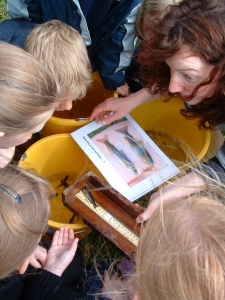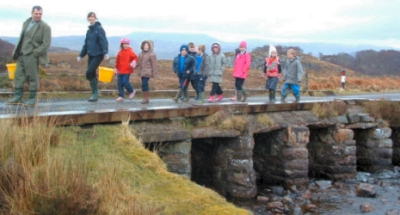Salmon and Trout in the Classroom

The "Salmon in the Classroom" project, led by Dr Lorna Brown, gives children first-hand knowledge of wild salmon
Since 2003, local primary schools have participated in the "Salmon and Trout in the Classroom" Project. This project was based on the "Salmon in the Classroom" project first developed by the West Galloway Fisheries Trust. The project generates much interest and enthusiasm for learning about wild fish. Pupils gain hands-on experience nurturing salmonid eggs in a classroom hatchery and in so doing, learn about the ecology of the fish and the local ecosystem.
Between 2003 and 2006, the project was carried out at 16 primary schools from Ullapool in the north to Glenelg in the south of the WRFT area, with support from The Royal Society, Scottish Natural Heritage and the Highland Council.
The project starts with a visit, usually in early February, from a WRFT biologist who gives the pupils an insight into the complex lifecycle of salmon and sea trout. After the classroom presentation, the pupils are given eyed-eggs for their classroom hatchery and provided with instructions for caring for them. After a few weeks, the eggs hatch and the children watch the alevins grow. When the yolk sacs have been absorbed and the little fish have reached the 'swim up' stage, the pupils go on a fieldtrip around Easter time to a nearby stream to release their fish and learn about the habitat requirements of their fish. The following autumn, an electro-fishing field trip allows the pupils to find out not only how their own fish are getting on but what other fish live in the river. The pupils also find out more about the stream-ecosystem by kick-sampling for invertebrates, and looking at bones in otter spraints.
In 2009, biologist and qualified school teacher Dr Lorna Brown livened up the usual Powerpoint presentation by interspersing it with games and activities to get the pupils thinking more about the factors which affect the fish. One game which has proved to be very popular is our food-web game. Each pupil chooses to be a freshwater plant or animal, then all the predators and prey are linked together using string; a huge spider's web effect is created. Other pupils then get to be "baddies" such as "otter roadkills", "overfishing", or "pollution". As each level of the food-chain falls to the ground dead the pupils get to see the influence humans can have on the whole ecosystem.
In 2009 WRFT secured funding through RAFTS and SNH to purchase new classroom hatcheries. The new tanks have a thermostatically controlled cooler to regulate the temperatures in the tank. Gone are the days of changing ice packs morning and noon! The teachers have been impressed with the new systems finding them simple to use, and the pupils have been delighted to find that the egg mortality has dropped away to almost zero.

River Ewe ghillie Ray Dingwall, Poolewe primary school teacher Ms Darlington and children head for the Tollie Burn to stock out their salmon fry in March 2008
Related Downloads
To download a file, right-click over it's name and choose Save Link/Target As...
-
Award for Educational Projects
WRFT has received an award, from the Highland Council, for its educational projects in both primary and secondary schools in Wester Ross. Posted: 29/12/2010 (569KB)